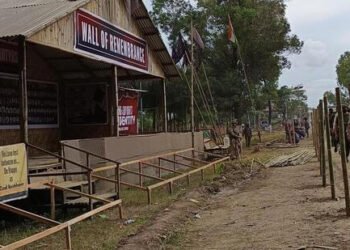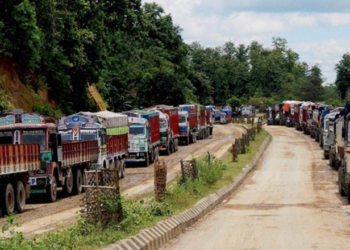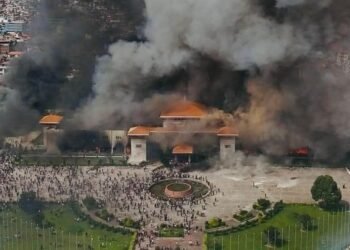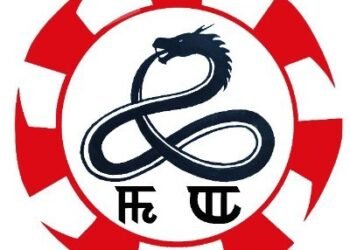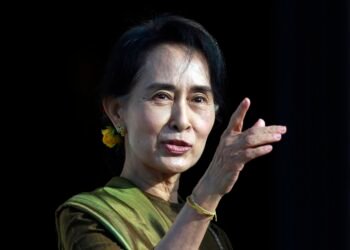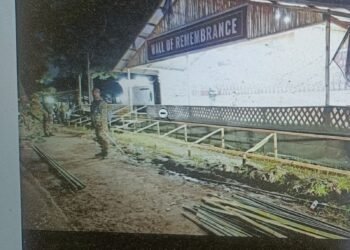District administration’s move to clear Peace Ground sparks backlash in Manipur’s Churachandpur town ; UKNA dictates force civil groups to restore coffins.
By Navin Upadhyay
September 7, 2025 – The symbolic dummy coffins representing the martyrs of the ethnic clashes that erupted on May 3, 2023, have been reinstated at the Wall of Remembrance in Churachandpur, Manipur, just days before Prime Minister Narendra Modi’s anticipated visit to the state on September 13.
Sources speaking to Power Corridors revealed that the coffins were removed last week at the behest of the district administration to avoid any potential embarrassment to the Prime Minister during his planned stopover at Peace Ground in the Kuki-Zo dominated hill district. However, following threats of “dire consequences” from the United Kuki National Army (UKNA), a non-signatory to the Suspension of Operations (SoO) agreement with the Ministry of Home Affairs, local civil society organizations (CSOs) and student bodies decided to place the coffins back in their original position.
The reinstatement comes amid heightened preparations for Modi’s first visit to Manipur since the violence began, which has claimed over 260 lives and displaced thousands. The Wall of Remembrance, located at Peace Ground in Tuibong, serves as a somber memorial to Kuki-Zo victims of the conflict, with the dummy coffins—a stark symbol of grief and loss—frequently featured in community protests and vigils. Their removal on August 31, 2025, was reportedly a mutual decision between CSOs and the Joint Students’ Body (JSB), but it was interpreted by some Meitei groups as a retreat or concession to please the visiting Prime Minister, leading to social media attacks on the Kuki-Zo community for allegedly disrespecting their own martyrs.
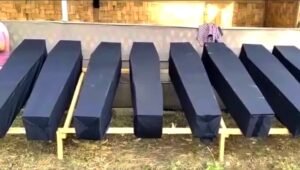
Sources indicated that the district administration, particularly the local Superintendent of Police (SP), reached out to several CSOs and individuals in a bid to persuade UKNA cadres to relent on the sensitive issue. However, these interventions proved futile, with the insurgent group standing firm on its demand. The UKNA, formed in 2015 and active in Churachandpur and surrounding Kuki-majority areas, has a history of internal conflicts and is not bound by the SoO framework that governs other Kuki-Zo armed groups like the Kuki National Organisation (KNO) and United People’s Front (UPF).
In the past, local CSOs had staunchly refused to remove the coffins despite specific court orders and repeated attempts by the administration to clear the site for security or aesthetic reasons. This history of resistance made the timing of last week’s removal particularly contentious, raising eyebrows even among ordinary citizens in Churachandpur. The sudden decision fueled suspicions that it was politically motivated, especially with Modi’s visit looming large. Preparations for the Prime Minister’s itinerary include public addresses at Kangla Fort in Imphal and Peace Ground in Churachandpur, with the latter site now hosting the reinstated coffins, potentially complicating the optics of the event.
Community Backlash and Social Media Storm
The removal sparked immediate backlash from within the Kuki-Zo community and beyond. Meitei social media users launched a barrage of criticism, accusing Kuki-Zo leaders of compromising even their dead. Posts on platforms like X (formerly Twitter) and Facebook highlighted the coffins’ role in previous rallies, such as the June 2023 silent march with 108 coffins and a November 2024 procession for Jiribam victims, framing the removal as a betrayal of communal memory. This online vitriol exacerbated existing ethnic divides, with some users from the Meitei community celebrating it as a “step toward normalization,” while Kuki-Zo voices decried it as an erasure of their suffering.
READ: Manipur Peace Deal: KNO, UPF Slam PIB’s ‘Distorted’ Claim
The reinstatement on September 6 has been met with mixed reactions. While CSOs and student bodies view it as a necessary assertion of dignity, it has reignited debates about the balance between community symbolism and state-driven security protocols ahead of high-profile visits. Security in Churachandpur has been intensified, with the district declared a “no drone zone” since September 4 under Section 163 of the Bharatiya Nagarik Suraksha Sanhita, 2023, to safeguard the “VVIP” event. Violations carry penalties under Section 223 of the Bharatiya Nyaya Sanhita.
Kuki Inpi’s Joint Meeting: A Call for Acknowledgment and Resolution
In a related development, Kuki Inpi Manipur (KIM), the apex body representing the Kuki community, held a joint meeting on September 7 at its secretariat in Churachandpur. Attendees included representatives from Kuki Inpi Churachandpur, the Kuki Women’s Union, Kuki Students’ Organisation, and Kuki Chiefs Association. Without directly addressing the coffin controversy, the meeting discussed the earlier resolution on the Wall of Remembrance and dummy coffins, emphasizing that “their placement and removal had been guided by respect for martyrs and practical considerations.”
READ: From “Insult” to “Apology”: How Congress Targets PM Modi’s Manipur Trip
Broader Context: Fragile Peace and PM’s Visit Preparations
Modi’s visit follows recent confidence-building measures, including the renewed SoO agreement signed on September 4, 2025, between the Centre, Manipur government, and Kuki-Zo groups under KNO and UPF. However, the coffin episode highlights persistent undercurrents of distrust. Churachandpur remains a flashpoint, with extensive security deployments including jammers, anti-sabotage checks, and multi-layer policing at Peace Ground. A grand stage for 9,000 attendees is under construction, and helipads are being prepared.
As Manipur braces for the visit, the reinstatement of the coffins underscores the delicate balance between healing ethnic wounds and navigating political sensitivities. With thousands still in relief camps and the assembly under suspended animation until 2027, the event could either foster dialogue or expose lingering fractures. For now, the Wall of Remembrance stands as a testament to the Kuki-Zo community’s unyielding demand for justice and recognition amid the shadows of conflict.



